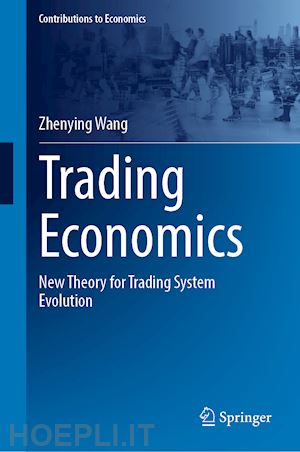
Questo prodotto usufruisce delle SPEDIZIONI GRATIS
selezionando l'opzione Corriere Veloce in fase di ordine.
Pagabile anche con Carta della cultura giovani e del merito, 18App Bonus Cultura e Carta del Docente
This book reconstructs the theoretical framework of economics by examining the concept of trading, the trading network, and the evolution of a trading system, tied together by the notion of “bounded rationality.” Trading economics uproots the theoretical paradigm of mainstream economics and enables timeworn economic thinking to deal with the various complex phenomena of the modern economy.
Mainstream economic theories see growth as the combined result of family and enterprise activities. Based on this understanding, established economic policies all focus on how to effectively influence the behavior of trading agents. Trading economics, by contrast, believes economic growth is the product of the activities of a self-organizing network of families and enterprises, rather than a simple superposition of the behaviors of trading agents. In policy design, trading economics looks to maintain the structural integrity of the trading network and the stability of the trading cycle.
Chapter 1. Trading System.- Chapter 2. Trading Agents.- Chapter 3. Accounting Matrix.- Chapter 4. Expansion of Trading Probability.- Chapter 5. Expected Return Function.- Chapter 6. Trading Principles.- Chapter 7. Equilibrium of Trading System.- Chapter 8. Trading Community.- Chapter 9. Trading Network Generation.- Chapter 10. Trading Network Expression.- Chapter 11. Layered Structure of Trading Network.- Chapter 12. Phase Structure of Trading Network.- Chapter 13. Aggregation Structure of Trading Network.- Chapter 14. Compactness of Trading System.- Chapter 15. Trading Equation.- Chapter 16. Interpretation of Trading Phenomena.- Chapter 17. Trading Loop.- Chapter 18. Distribution of Trading Potential.- Chapter 19. Evolution Equation of Trading System.- Chapter 20. Evolution of Trading Space.- Chapter 21. Phase Transition of Trading Status.- Chapter 22. Business Cycle Model Chapter.- 23. Economic Growth Model.- Chapter 24. Trading Pricing Model.- Chapter 25. Efficiency Decay ofTrading Systems.- Chapter 26. Imperfection of Trading Systems.
Zhenying Wang is a research fellow at the People's Bank of China. He received his Ph.D. from Renmin University of China in 1994. According to his long working experience in the central bank, he creatively proposed a new theory of Complexity Economics, and his monograph Principles of Trading Economics was published in 2016. The book "Principles of Trading Economics" has received widespread attention from the academic circles.











Il sito utilizza cookie ed altri strumenti di tracciamento che raccolgono informazioni dal dispositivo dell’utente. Oltre ai cookie tecnici ed analitici aggregati, strettamente necessari per il funzionamento di questo sito web, previo consenso dell’utente possono essere installati cookie di profilazione e marketing e cookie dei social media. Cliccando su “Accetto tutti i cookie” saranno attivate tutte le categorie di cookie. Per accettare solo deterninate categorie di cookie, cliccare invece su “Impostazioni cookie”. Chiudendo il banner o continuando a navigare saranno installati solo cookie tecnici. Per maggiori dettagli, consultare la Cookie Policy.